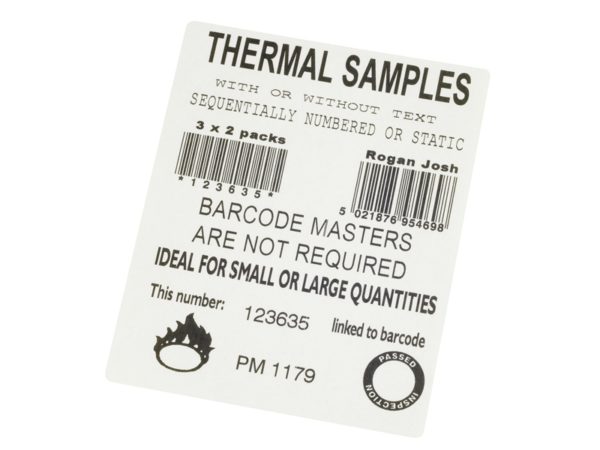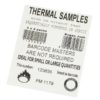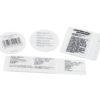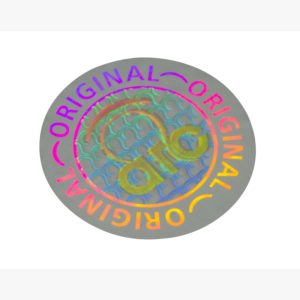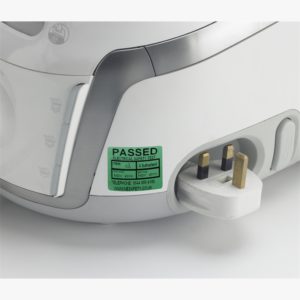Deep Freeze Labels
Home / Full Product Range / Industrial and Security Labels / Deep Freeze Labels
We supply a range of labels with various deep freeze adhesives. On rolls, sheets or fanfolded, the end uses can vary from the product labelling of frozen fish to the identification of medical vials. Some label manufacturers may supply you with what they consider to be a ‘standard’ deep freeze product. However have they considered the application temperature as well as the service temperature? For instance, some adhesives are specially developed for labelling at actual refrigerator temperatures, whilst some are onto food packaging before deep-freeze conditions.We work closely with all of the major raw material suppliers and keep abreast of new adhesive developments, supplying you with hard copy or electronic specification sheets for your records. As well as bespoke products, we carry a massive selection of plain and printed deep freeze labels on rolls and sheets.
Deep Freeze Labels FAQs
Items stored in a deep freeze need to withstand temperatures from -18°C to -30°C but can go as low as -50°C. This is to keep perishable goods fresh in the long term. Deep freezer storage is found in commercial and industrial settings, in food storage, or used to store scientific samples.
Deep freeze labels are required on food products, especially meat, seafood, prepared foods, frozen vegetables, and packaged food items intended for sale as frozen food. These labels identify the contents, expiration dates, and other information that’s integral to good food safety.
Laboratories store biological samples such as blood, tissue, or other specimens in deep freezers. In the pharmaceutical industry, certain medications and vaccines need to be stored at very low temperatures to preserve their efficacy. Labels provide essential details such as lot numbers, expiration dates, and storage conditions.
Deep freeze labels, as the name suggests, are specifically designed to preserve integrity at low temperatures. They come with adhesives that remain stick in extreme cold and can stay stuck to plastic, metal, or cardboard. The label materials are temperature resistant and will not crack or go brittle.
These labels are water and frost resistant, which means condensation or frost won’t obscure any details on the label. Deep freeze labels are also chemical resistant, to prevent any smudging or damage from harsh solvents.
Label service works with a huge variety of businesses and industries that need good quality deep freeze labels. Including, food manufacturers and distributors, pharmaceutical companies, laboratories, restaurants, bakeries, supermarkets and catering companies. We supply labels for hospitals and medical research facilities.
There are differences between the labels used for deep freeze storage conditions and domestic freezers. Deep freeze labels tend to be more durable due to the more extreme temperature ranges they have to handle. These labels tend to use more durable adhesives and have to be more carefully engineered for a wider range of more demanding applications. Domestic freezer labels can handle low temperatures but are not built for more demanding conditions.
We supply a range of labels with various deep freeze adhesives. On rolls, sheets or fanfolded, the end uses can vary from the product labelling of frozen fish to the identification of medical vials. Some label manufacturers may supply you with what they consider to be a ‘standard’ deep freeze product. However have they considered the application temperature as well as the service temperature? For instance, some adhesives are specially developed for labelling at actual refrigerator temperatures, whilst some are onto food packaging before deep-freeze conditions.We work closely with all of the major raw material suppliers and keep abreast of new adhesive developments, supplying you with hard copy or electronic specification sheets for your records. As well as bespoke products, we carry a massive selection of plain and printed deep freeze labels on rolls and sheets.
Deep Freeze Labels FAQs
Items stored in a deep freeze need to withstand temperatures from -18°C to -30°C but can go as low as -50°C. This is to keep perishable goods fresh in the long term. Deep freezer storage is found in commercial and industrial settings, in food storage, or used to store scientific samples.
Deep freeze labels are required on food products, especially meat, seafood, prepared foods, frozen vegetables, and packaged food items intended for sale as frozen food. These labels identify the contents, expiration dates, and other information that’s integral to good food safety.
Laboratories store biological samples such as blood, tissue, or other specimens in deep freezers. In the pharmaceutical industry, certain medications and vaccines need to be stored at very low temperatures to preserve their efficacy. Labels provide essential details such as lot numbers, expiration dates, and storage conditions.
Deep freeze labels, as the name suggests, are specifically designed to preserve integrity at low temperatures. They come with adhesives that remain stick in extreme cold and can stay stuck to plastic, metal, or cardboard. The label materials are temperature resistant and will not crack or go brittle.
These labels are water and frost resistant, which means condensation or frost won’t obscure any details on the label. Deep freeze labels are also chemical resistant, to prevent any smudging or damage from harsh solvents.
Label service works with a huge variety of businesses and industries that need good quality deep freeze labels. Including, food manufacturers and distributors, pharmaceutical companies, laboratories, restaurants, bakeries, supermarkets and catering companies. We supply labels for hospitals and medical research facilities.
There are differences between the labels used for deep freeze storage conditions and domestic freezers. Deep freeze labels tend to be more durable due to the more extreme temperature ranges they have to handle. These labels tend to use more durable adhesives and have to be more carefully engineered for a wider range of more demanding applications. Domestic freezer labels can handle low temperatures but are not built for more demanding conditions.


